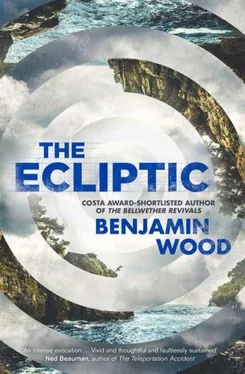Everything about it was familiar — the groove in the metal, the phoney gold lacquer worn away in all the same places — but, turning it over in my fingers, I saw that it was not a ferry token. Its faces had no markings. This must have been what the boy had flashed at me that day, when I had confronted him about the broken window. I felt strangely disapproving of him, then disappointed in myself for not expecting he would lie to me.
The drafting table seemed out of place, moved in from someone else’s studio. When I connected the desk lamp, it cast a doomy light over the surface: there were handprints on the laminate, pencil marks and skids from an eraser. An array of papers rested on the table’s narrow ledge: finely textured sheets, a heavy gauge, expensive. Apart from the foremost page, which showed a rectangle sketched in freehand, they looked unused. I checked them against the lamplight, hoping I might find the indentations of the boy’s handwriting; but, instead, I saw the fault lines of a picture in the paper, fading through each sheaf.
I took the graphite stick and rubbed it sidelong over the page with the heaviest depressions. Bit by bit, the faint white furrows left in the graphite began to form an illustration. It was made of four thin panels, about an inch across and several high. Each box contained a line drawing of one man’s face in close-up. They showed his dawning expression: (i) gasping anger; (ii) recognition; (iii) a softening of the brow; (iv) tears.
Even as a rough negative like this, it was a spectacular drawing: an assembly of simple lines, some feathered, some solid, that seemed to lift the man’s whole character from the blankness. I had seen this exaggerated style somewhere before, but could not think where. There was a darkness to it, an acuteness of detail. The character’s face was ageless and muscular, the sinews of his neck implied through subtle cross-hatching. He looked hewn from a block of lumber — superhuman — but also jaded, fragile. At the bottom of the page were the makings of a signature I could not read: an L, perhaps an N, and a thatch of jagged squiggle.
I put the drawing to one side and searched the cupboard by the table. There was nothing in it but a pine cone and a pencil sharpener and three red guitar picks. In the boy’s closet, I found his cagoule and a canvas bag half stuffed with clothes: his bee-striped sweatshirt was in there with the rest of his dank laundry. I checked the pockets of all the jeans and discovered only lint. There was a fountain pen and a Roman coin in the boy’s sock drawer, along with a few seashells and Pettifer’s camphor-wood turtle, which I could not resist winding up and letting spin across the floor. It scuttled underneath the chest of drawers; I could not retrieve it. On the bedside table was a paperback of Huckleberry Finn , loaned from the mansion library; it bore the provost’s stamp on the back cover and a strip of dental floss was serving as a bookmark three hundred pages in.
I checked every recess of the place, from the gap under the bed-frame to the shelf above the roller blinds, and even the boy’s stove (I saw the grate was resting slightly off its latch). There was barely a mote of ash inside and the coke-scuttle below it was almost empty. On the blindside of the fluepipe, though, I noticed Quickman’s lighter. I spent a moment trying to make it flame. It would not even spark — perhaps it never had.
The bathroom was the only place left to inspect, but I could not bring myself to search it. Instead, I put the boy’s drawing and the trinkets into my satchel and left. The wooden crate that he had sat upon to make his scribblings was still out on the walkway. I rested there awhile, trying to view things from the boy’s perspective. That marshy, weathered lawn. The bare bones of the pomegranate trees. This little patch of ground was such a wondrous place to be in springtime, when oleanders bloomed between the pines and all the fading purples of the sunset seemed brand new, uncharted. It was the best spot to put down a chair and watch the sky for herons. Now the winter had corrupted it.
I leaned the crate against the wall and headed for my lodging. Even at its borders, the grass was swampy, so I kept to the trail of grit and sawdust Ardak had laid down. It cut a line in the wrong direction — towards the mansion and away from my studio, where it joined the regular footpath. But I could already hear warbles of laughter up ahead, from short-termers on the portico, and the sound of them revolted me.
So I broke off the path and went straight across the grass. The clay soil underneath was thick and tacky, and I remembered how it cleaved to Fullerton’s skin on his first night. He had dug through it with his hands when he could not find his matches. It had rung against the innards of the oil drum like loose change. And then—
I stopped.
I turned so fast I nearly left my shoes behind me in the clay.
The rusty drum was still standing on the open ground ahead, but tilted now, subsiding. It was skirted by a pool of water that I had to hurdle. My heels went skiing on the other side and I grabbed the can to keep from falling on my face. I tried to heave it up, but the dirt inside had been compacted by the rainfall and it would not budge. It did not even wobble. The only thing to do was scoop the soil out by the fistful, until the can was light enough to tip over.
I clawed at the dirt, tossing debris over my shoulder.
When my fingers were too sore to carry on digging, I gave up. I kicked hard at the drum and it shifted in the mud. It was just light enough for me to haul into the trees, ploughing a runnel through the grass behind me.
Under the pines, the ground was not so wet. I pushed the drum on its side, spilling its contents. Amid the clods of soil there was a soggy mass of colour. A saturated pile of magazines the size of Reader’s Digest s. I had to gently excavate them.
The first one I pulled out was flecked with mud, congealed, but the cover was still glossy underneath, a little oily to the touch. I brushed off the muck from its middle. It was not a magazine at all.
A shirtless young man with plaited hair snarled back at me, meticulously drawn. His wrists were cuffed with iron shackles and crossed beneath his chin. Thin strings of saliva hung from his blunt teeth like guy-ropes, and, on the crest of his tongue, was a black key small enough to fit a music box.
It was a comic book.
The draughtsmanship was faultless and familiar, bearing the same jagged signature as I had noticed on the drawing in the studio. I had to rub away more dirt to see the title clearly. My heart seized at the sight of it.

It was as though I was staring at my own face in someone else’s family portrait.
The lettering was designed to look held on by rivets, and the author’s name — the boy’s name? — had been sliced out with a blade. It was a sodden mess of paper, but I felt the oddest kind of intimacy with it. Whoever Fullerton had been, he was contained inside those pages. Not just his talent and his labour, but every last peculiar shape that ever lurked in his imagination. I was overwhelmed by a responsibility to preserve it. This and every other comic in the pile.
There were footfalls now in the distance, and a tuneful hum. Ender was tramping down the pathway from the mansion, singing quietly: ‘ Hey goo-loo, helleh helleh goo-loo . .’ I could not let him see me.
I lifted out as many comics from the soil as I could and tucked them in my coat. Three of them. Four. Five. Just when I was running out of room, I found another in the mud. That was all of them. I kicked through the rest of the dirt, levelling it off. And in that scattered mess, a square of burgundy showed through. The boy’s passport was there upon the mulch.
Читать дальше













